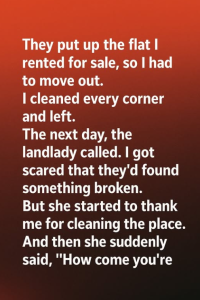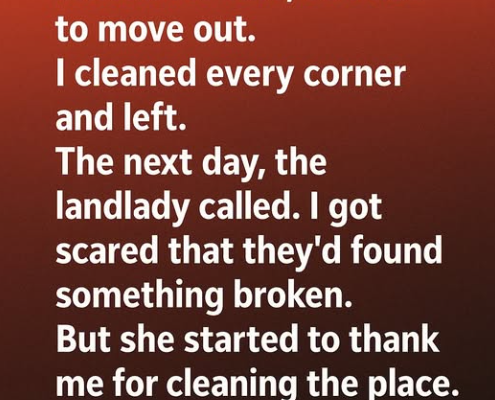
Leaving a Place Better Than I Found It Changed More Than I Knew — 1000 Words
There’s a simple rule many people hear growing up: leave a place better than you found it. For most of my life, it sounded like a polite suggestion—something you’d see on a motivational poster or hear from a teacher telling you to clean up after yourself. But I never truly realized the weight of that principle until I began living it with intention. What started as small, almost invisible acts of care slowly began reshaping the way I walked through my days, how I treated people, and even how I viewed myself. Somewhere along the way, the rule stopped being about places at all—and became something that changed me far more deeply than I expected.
I used to be someone who slipped quietly through the world, convinced that my presence barely mattered. I didn’t see myself as someone capable of creating an impact—not in a room, not in a friendship, certainly not in my community. But life has a way of teaching you that influence doesn’t always arrive through grand gestures or dramatic events. Sometimes it begins with something as unremarkable as picking up a piece of trash, wiping down a counter, or offering a smile to someone who looked like they hadn’t received one all day.
The shift began during a time when I felt stuck—uninspired, disconnected, and weighed down by the feeling that my days were blending together. I didn’t have the energy to chase big goals or reinvent myself. But I did have enough energy to make tiny improvements in the spaces around me. So I started there. If I walked into a room where a chair was crooked, I straightened it. If someone looked lost, I pointed them in the right direction. If a conversation felt tense, I did what I could to leave it softer than I found it.
It sounds insignificant. In the beginning, it was. But those small choices began changing something internal. For the first time in a long time, I felt like I was adding something to the world rather than just passing through it.
There’s something powerful about choosing to be useful. Not because anyone asked you to, not because you’ll be thanked, but simply because you can.
Once I started paying attention, I saw opportunities everywhere—tiny moments where kindness could be placed like a seed. A compliment that lifted a coworker’s mood. A quiet apology that defused tension. A small favor that made someone’s day a little easier. These gestures weren’t dramatic, but they were meaningful, and not only for the people receiving them. They were meaningful for me. Each act was like laying a brick in the foundation of a stronger, more intentional version of myself.
The biggest discovery came when I started applying the principle not just to physical spaces, but to relationships. Leaving someone better than I found them doesn’t always mean cheering them up or fixing their problems. Sometimes it means listening without trying to win. Sometimes it means offering honesty even when it’s uncomfortable. Sometimes it’s letting someone walk their own path while you walk beside them without judgment.
And sometimes, it’s knowing when to step back and not leave damage behind.
It’s in friendships where I learned the most. I began asking myself questions I’d never considered before: Did I bring peace or tension into this moment? Did I make this person feel heard or overlooked? Did I offer comfort, or did I take more than I gave? Those questions became a compass. They taught me to speak gently, to think before reacting, and to show up for others in the way I’d want someone to show up for me.
Leaving a place better than I found it also changed the way I viewed endings. Not every story ends neatly, and not every connection is meant to last. But there’s a certain kind of grace in making sure that when I walk away—from a job, a friendship, a relationship, or even a moment of conflict—I don’t leave destruction behind me. I learned to close doors softly, with gratitude instead of bitterness, with maturity instead of spite.
One of the most surprising lessons was how this mindset affected my relationship with myself. For years, I’d been harsh with my own flaws, impatient with my progress, and unkind to my inner voice. But what if I could leave my own internal space better than I found it each day? What if I could offer myself the same patience and attention I had begun offering others?
So I started small there, too.
A few moments of stillness. A break when I was overwhelmed. A positive thought to counter the negative ones. With time, those tiny acts of internal kindness built a more grounded, self-aware version of me. The principle expanded outward and inward, reaching parts of my life I didn’t expect.
The truth is, leaving a place better isn’t about cleanliness or order—it’s about responsibility. It’s about acknowledging that your presence has weight. That you affect the things and people you touch, whether you mean to or not. It’s about realizing you have the power to add value to moments simply by choosing to care.
And the most unexpected part? The more I focused on improving the world around me, the more I improved myself. I became more mindful, more compassionate, more present. I began noticing beauty in ordinary things because I was no longer rushing past them. I connected more deeply with people because I was paying attention. And slowly, life felt richer—not because it got easier, but because I learned how to contribute something meaningful to it.
Today, the philosophy guides me in quiet but steady ways. I don’t need recognition. I don’t need perfection. I don’t even need to see the results of what I do. What matters is that when I leave a room, a conversation, a relationship, or a day, I can trust that I added more than I took.
It’s a humble way to live, but it’s also a powerful one.
Because when you commit to leaving things better—bit by bit, moment by moment—you discover that the world responds in ways you never imagined. And in the end, the place that transforms the most is the one inside you.

